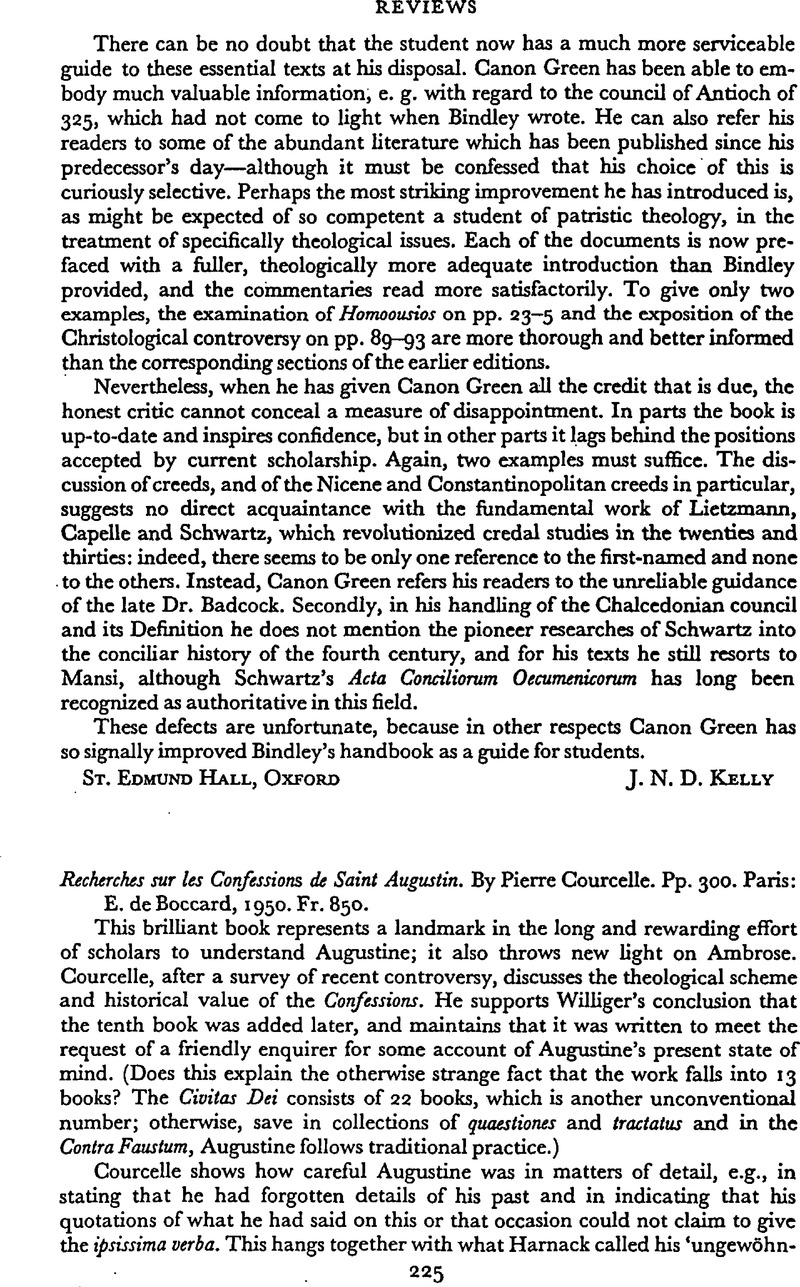No CrossRef data available.
Article contents
Recherches sur les Confessions de Saint Augustin. By Pierre Courcelle. Pp. 300. Paris: E. de Boccard, 1950. Fr. 850.
Published online by Cambridge University Press: 25 March 2011
Abstract

- Type
- Reviews
- Information
- Copyright
- Copyright © Cambridge University Press 1951
References
page 226 note 1 Sitzungsber. Berlin, 1905, 1099. Cf. Rose, H. J., Proc. Comb. Philol. Soc. 1926, 13f.Google Scholar on the story of Curma in De cura pro mort. 12 (15). In view of this characteristic of Augustine's his evidence in Civ. D. vii. 26 on the castrati in the service of Cybele is the more significant for the controversy discussed in J. Rom. Stud, xxxviii (1948), 156Google Scholar.
page 226 note 2 There is an analogy in Origen's discussion with Heraclides, etc., as edited by J. Scherer (Publ. Soc. Found I, Textes et documents, ix); cf. my forthcoming review in Am. J. Arch.
page 226 note 3 Cf. P. Henry, Vision d'Ostie, 105. Is there any parallel for a man starting to write so late and then producing so much?
page 226 note 4 Léévolution intellectuelle de Saint Augustin, 172 f. So C. Faust, xviii. 3: idcircoque me ne hie quidem terruerit sermo is parallel to De util. cred. 1, 2: terribili auctoritate separata.
page 226 note 5 De beata vita i. 4: in sckola rhetoris.… accepi; Conf. iii. 4, 7: usitato iam ordinediscendi (for O. d. cf. Ep. 118.13; ib. 21 is further evidence for the review of philosophical opinions as a normal part of rhetorical training).
page 226 note 6 Cf. my Sallustius, xvii ff. Cicero, Paradoxa, pr. 5 says of that treatise: ad nostrum hoc oratorium transfero dicendi genus.
page 226 note 7 So notably with reference to the idea that evil arose from a privation of good (Courcelle, 124). It is striking that Ambrose EP.34 (P.L.xvi. 1074) deprecates philosophy and recommends a man with intellectual problems to read Esdras, but nevertheless uses of souls the phrase aeterno illi et summo adhaerent bono. Augustine Ep. 118 is an interesting contrast and one may almost wonder whether he had learned something from his experience with Ambrose.
page 227 note 1 For similar confusions in verse cf. Housman on Manilius 1, 416.
page 227 note 2 Conf. viii. 12, 29 f.
page 227 note 3 Cf. Cumont, Religions orientates (ed. 4), 225 n. 41; J. Toutain, Cultes paīens, 104 n. 4.
page 228 note 1 With Jülicher, A., Theol. Lit.-Z. xxviii (1903), 52 f.Google Scholar read lacenda not langenda.—For a further analogy cf. De mar. eccl. cath. 1, 2.
page 228 note 2 Cf. Courcelle 206 ff. (in the course of an interesting treatment of the difficulties which vexed Augustine at Cassiciacum).
page 228 note 3 In Abdiam 17–18 (P. L. xxv. 1112 A-B).
page 228 note 4 To the rich bibliography might be added the articles by A. Casamassa, A. Guzzo, and A. Pincherle in Encicl. Ital. i. 913 ff. and that by Silk, E. T. in Harv. Theol. Rev. xxxii (1939), 19 ff.CrossRefGoogle Scholar [W. M. Green's article in Univ. Cal. Publ. Class. Phil. xiii. no. 13 on Augustine's view of pride as the initial sin no doubt appeared too late for use; it includes, p. 419, interesting reference to Plotin. v. i, i. A new edition of G. Misch's book has just appeared in English translation as A History of Autobiography in Antiquity] Courcelle's excellent index of passages discussed deserves a special word of praise.




